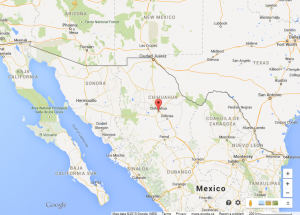Note: names have been changed
When we come to this farm with its adobe brick buildings, we see no people or farm animals. Ben, our driver, goes to the door to announce our arrival. Our van load of visitors is invited into the large, spotless main room where Ben introduces us to the 62-year-old mother. Mrs. Wiebe’s feet are shod in black Schlorre (slippers), a kerchief covers her head, and her outfit consists of several layers of dresses topped with a cardigan sweater. She smiles when she sees us and invites us to sit on the long wooden bench. The three Wiebe daughters, meanwhile, have much to tell us and all three talk at once in a breathless, animated manner. Apparently a skunk had strangled their last two chickens and since that time they have existed on beans. Indeed, a pot of beans is simmering on the range as we visit. Earlier, they had been able to sell an occasional egg for a few pesos.
 It is a chilly morning and a large, black stove – its pipes crossing the ceiling – heats the room. Blankets cover the broken window panes. A high bed stands on one wall and a large Schrank (cupboard) stands next to where we are sitting.
It is a chilly morning and a large, black stove – its pipes crossing the ceiling – heats the room. Blankets cover the broken window panes. A high bed stands on one wall and a large Schrank (cupboard) stands next to where we are sitting.
Meanwhile, Ben and Mrs. Wiebe are talking at the table. He gives her 20 pesos and presses her hand firmly around the money. Ben says that she should buy a few chickens with it and he will come and eat a fried egg with them. With that, we take our leave. The Wiebes thank us for our visit and see us out. The inside door they pull open with a rag; Ben finds a screw driver to open the outside door.
As we drive away, Ben explains that this family has little contact with the outside world – no visitors have come in many months time – hence the daughters’ excitement. They have no connection with the church and the little money Mr. Wiebe earns at the cheese factory, a son-in-law uses to support his dependence on alcohol. Can Mrs. Wiebe then be trusted to use the money to buy chickens, we ask? Ben thinks yes. The son-in-law will not take money from the old mother.
